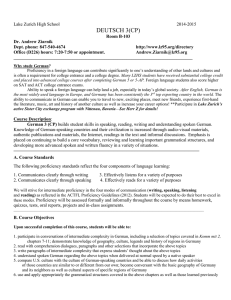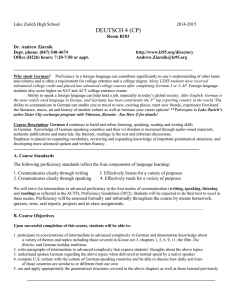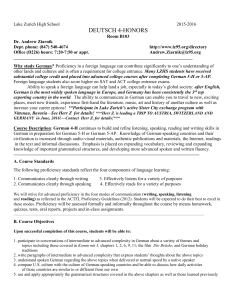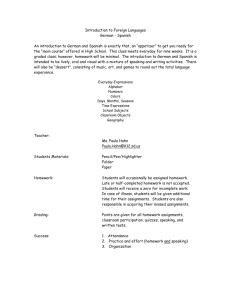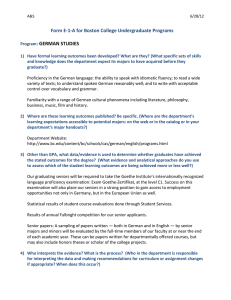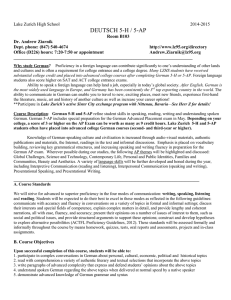DEUTSCH 3-HONORS
advertisement
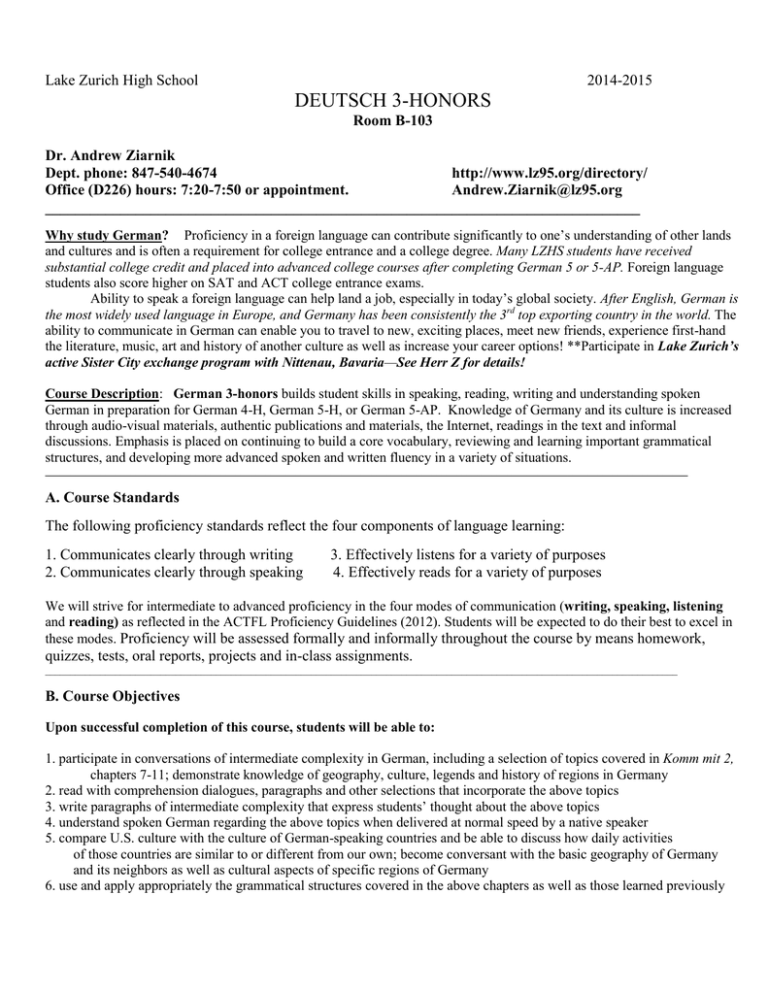
Lake Zurich High School 2014-2015 DEUTSCH 3-HONORS Room B-103 Dr. Andrew Ziarnik Dept. phone: 847-540-4674 http://www.lz95.org/directory/ Office (D226) hours: 7:20-7:50 or appointment. Andrew.Ziarnik@lz95.org _______________________________________________________________________________ Why study German? Proficiency in a foreign language can contribute significantly to one’s understanding of other lands and cultures and is often a requirement for college entrance and a college degree. Many LZHS students have received substantial college credit and placed into advanced college courses after completing German 5 or 5-AP. Foreign language students also score higher on SAT and ACT college entrance exams. Ability to speak a foreign language can help land a job, especially in today’s global society. After English, German is the most widely used language in Europe, and Germany has been consistently the 3rd top exporting country in the world. The ability to communicate in German can enable you to travel to new, exciting places, meet new friends, experience first-hand the literature, music, art and history of another culture as well as increase your career options! **Participate in Lake Zurich’s active Sister City exchange program with Nittenau, Bavaria—See Herr Z for details! Course Description: German 3-honors builds student skills in speaking, reading, writing and understanding spoken German in preparation for German 4-H, German 5-H, or German 5-AP. Knowledge of Germany and its culture is increased through audio-visual materials, authentic publications and materials, the Internet, readings in the text and informal discussions. Emphasis is placed on continuing to build a core vocabulary, reviewing and learning important grammatical structures, and developing more advanced spoken and written fluency in a variety of situations. ________________________________________________________________________________________________________________________________ A. Course Standards The following proficiency standards reflect the four components of language learning: 1. Communicates clearly through writing 2. Communicates clearly through speaking 3. Effectively listens for a variety of purposes 4. Effectively reads for a variety of purposes We will strive for intermediate to advanced proficiency in the four modes of communication (writing, speaking, listening and reading) as reflected in the ACTFL Proficiency Guidelines (2012). Students will be expected to do their best to excel in these modes. Proficiency will be assessed formally and informally throughout the course by means homework, quizzes, tests, oral reports, projects and in-class assignments. ______________________________________________________________________________________________________________________________ B. Course Objectives Upon successful completion of this course, students will be able to: 1. participate in conversations of intermediate complexity in German, including a selection of topics covered in Komm mit 2, chapters 7-11; demonstrate knowledge of geography, culture, legends and history of regions in Germany 2. read with comprehension dialogues, paragraphs and other selections that incorporate the above topics 3. write paragraphs of intermediate complexity that express students’ thought about the above topics 4. understand spoken German regarding the above topics when delivered at normal speed by a native speaker 5. compare U.S. culture with the culture of German-speaking countries and be able to discuss how daily activities of those countries are similar to or different from our own; become conversant with the basic geography of Germany and its neighbors as well as cultural aspects of specific regions of Germany 6. use and apply appropriately the grammatical structures covered in the above chapters as well as those learned previously C. Expectations of the Teacher In order to successfully participate in this class, students will: 1. PARTICIPATE! You can only learn a second language if you actively practice—both in and out of the classroom. 2. BE PREPARED. Homework, pens, notebook, textbook and workbook are required every day. 3. RAISE YOUR HAND to speak or get out of your seat. All constructive participation is welcome, but students must raise their hands to speak so that others can hear and all have the same chance. 4. BE IN YOUR SEAT AND READY for class when the bell rings. CELL PHONES AND OTHER PERSONAL ELECTRONIC DEVICES ARE EXPECTED TO BE TURNED OFF AND PUT AWAY until required for class purposes. Students who frequently are not in their seats, do not have P.E.D.’s put away, and are not ready to begin class on time may lose participation credit. 5. RESPECT THE TEACHER AND YOUR CLASSMATES and USE APPROPRIATE LANGUAGE FOR SCHOOL No behavior that interferes with learning will be tolerated. Listen to the teacher and classmates when they participate. **CHEATING is unacceptable. Students caught cheating during assessment situations will receive a grade of zero (0) on that assignment, and parents may be notified. **DISCIPLINARY INFRACTIONS may negatively affect grades. ____________________________________________________________________________________ D. Evaluation of Student Progress (See Grading Policy handout for more specific information!) 1. GRADING: The quarter and semester grades are determined by the total number of points received for all tests, quizzes, homework, projects, in-class assignments and participation. 2. PARTICIPATION: Active use of a foreign language is essential for learning. Positive behavior, preparedness, being on time and attitude can affect your participation grade. Participation points make ca. 8-10% of the quarter grade. 3. HOMEWORK typically will be evaluated for completion and/or accuracy. Students can expect some kind of homework assignment most days of the week. Late assignments will be accepted, but will be awarded fewer points according to how late they are received. Consistent homework completion is important! Homework points make up ca. 10% of the quarter grade. *** Doing one’s own work is essential for learning. COPYING HOMEWORK AND USING ONLINE TRANSLATORS FOR MORE THAN DICTIONARY PURPOSES FOR ANY ASSIGNMENT IS UNACCEPTABLE. It is o.k. to consult with classmates about homework problems; however, any assignments that appear to have been copied—as well as the original that was copied--may not receive credit. Students may always see the teacher for help! 4. HOME STUDY: Time spent learning outside of class is essential for mastering a foreign language! The more you practice, the better your German will be, and the more you will get out of class. Practicing only in class will not lead to proficiency. A foreign language is a skill, and as with any skill, the more you practice, the better will be your performance! **It is recommended that students spend a minimum of 25 minutes per day outside of class studying for German 3-honors in order to reach their potential. Dr. Ziarnik Lake Zurich High School 2014-15 Grading Policy for German 3-Honors 1. Letter grades are determined as follows: Class Grades will not be rounded up. 100-97% = A+ 96-93 = A 90-92 = A89-87 = B+ 83-86 = B 80-82 = B- 77-79 = C+ 73-76 = C 70-72 = C67-69 = D+ 63-66 = D 60-62 = D59 and below = F Marking period and semester grades will be determined by the number of points gained for the ongoing, cumulative class point score. Example: (Marking Period total points earned) 485 / (Total possible points) 550 = 485/550 = 88.18% = B+ Total Possible Class Point Scores typically range as follows and may vary according to class: Per marking period: 500-600 Per semester: 1000-1200 2. Typical types of assignments and their approximate values: Short Homework Assignments (overnight—for completion or collected) = 3-8 points Long Homework Assignments (several days, e.g. readings and questions) = 16 – 25 points Journal (Tagebuch) or Essay (Aufsatz) = 15-20 points Short Quizzes = 5 – 15 points Bi-weekly Verb Quizzes = 20 – 30 points Chapter Tests = 70 – 100 points Projects (1 – 2 per semester) = 50 – 100 points Class Participation = ca. 5 points per week (= ca. 8-10% of quarter grade) Points are earned through using the target language, volunteering, and contributing in a positive way to learning in class. Class Participation points may deducted for excessive chatting, unpreparedness, lack of effort etc. 3. Late Work. Late homework or other assignments will be accepted for reduced credit. After one week, only minimal credit will be given for completing the late assignment (this includes homework, journals, and projects). 4. Make-up work: Students with legitimate, excused absences will have the opportunity to make up missed work. Make-up work must be done within several days of the absence, or else the missed grade may be marked as “0” or receive reduced credit. 5. Extra Credit: Extra credit will not be given, except occasionally to the entire class as part of a test, quiz, or review assignment. No exceptions!!! Strive to do your best on all types of assignments, and complete them on time!
